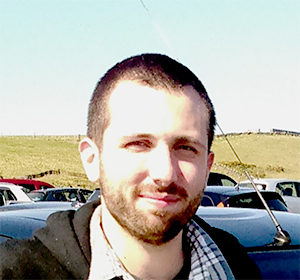 RCS is excited to feature the Director of Engineering for Hubbard Cincinnati, WKRQ, Brett Patram.
RCS is excited to feature the Director of Engineering for Hubbard Cincinnati, WKRQ, Brett Patram.
Brett Patram originally joined Hubbard Cincinnati to handle their local IT/network infrastructure needs. Though in addition to that, he was also handling the RF needs simultaneously. Eventually, Patram took over as Director of Engineering, claiming that it made the most sense for everyone.
In late 2019, Hubbard Cincinnati began work on their largest project which was building a new studio facility from the ground up. “We broke ground – construction began and so did my extensive planning of everything technology – radio and IT. With a lot of help and resources we made it happen and went live early last July,” he said.
In a couple of weeks, Patram will be moving back to Cleveland to resume work for the Telos Alliance as a support engineer, although he has nothing but good memories when looking back on the project and his time spent at Hubbard Cincinnati.
Currently, Patram primarily works with RCS products, GSelector and Zetta, in addition to Revma. His reasoning for choosing RCS comes down to its progressive development.
“As a previous NexGen facility, we were used to certain luxuries that NexGen offered. When it was time to review our automation choices, we were a bit surprised to find that the other vendors were still playing catch-up to NexGen! Zetta in comparison was years ahead, and was a mature product with years of development behind it.”
Patram’s choice to migrate from RCS Selector to GSelector made the most sense, based on the full integration the two products shared with each other. “We have a very particular staff that at times are very passionate about the tools they use to program and run their stations. We saw several workflow improvements that they couldn’t do without the Zetta and GSelector integration existing.” says Patram.
RCS Disaster Recovery was also included in Patram’s line of RCS products, citing that he needed a backup solution that was multifaceted. He said, “It helps us in several ways. We are always sending a current backup snapshot of our database and audio assets into the cloud. We don’t have to be directly responsible to maintain this environment.
“Our logs are also being synced and played out in the cloud environment. This creates the ultimate backup audio solution for us. When we need it, it’s always available and it’s actually going to be what we programmed and scheduled — not some canned fill audio.
“At our transmitter sites and even in the studios the streamed feed of the RCS Cloud DR instance is made available to switch into. Because all our logs and assets are backed up into this environment, all our spots continue to play if we needed to use it for any length of time.
“On top of that, being able to control these sequencers from a very familiar looking interface makes it that much easier in a true DR scenario to take control and ‘run’ the station from that environment.”
Patram also gives credit to the RCS onsite field services, saying that they did an amazing job working with the Hubbard staff by ensuring that all NexGen assets successfully migrated over to Zetta.
“It was a very smooth transition that had a lot of moving pieces. We really appreciate all the work that RCS put into our project.”